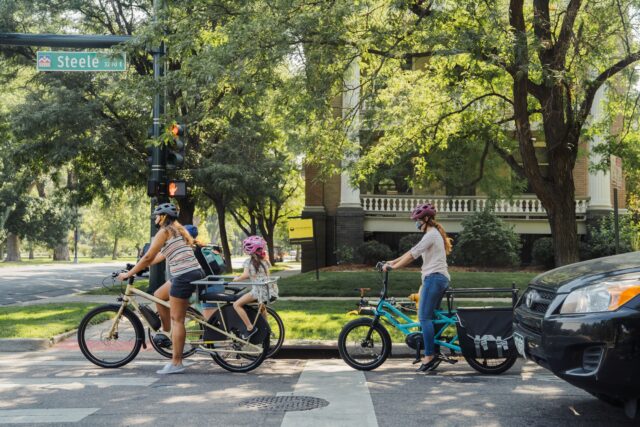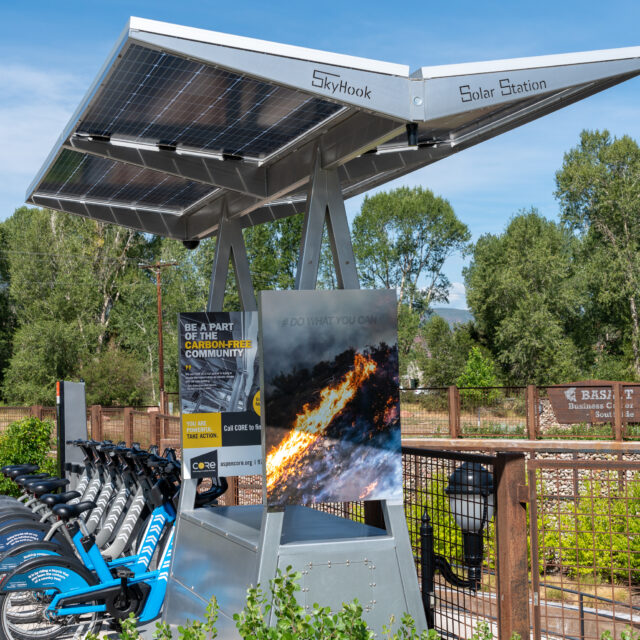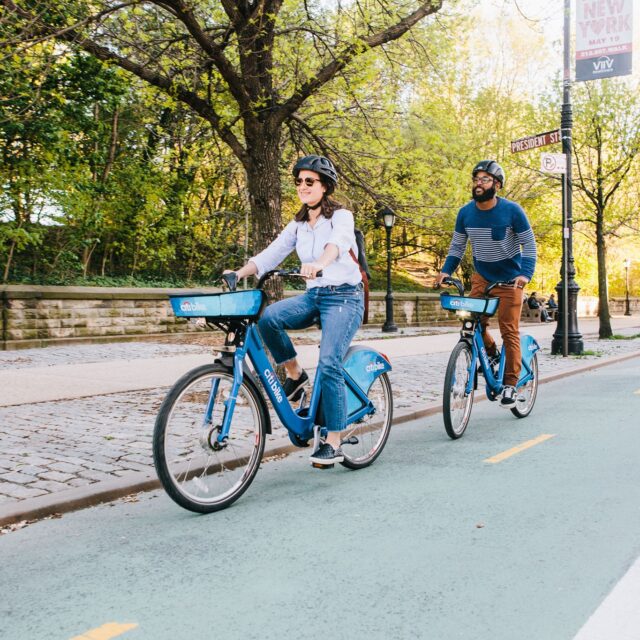Ditch Your Car, Ride a Bike
by Kiran Herbert, Communications Manager
November 23, 2021
Imagine if cities around the country allowed people to trade in junkers for bike share passes.

Our current environmental predicament demands unconventional ideas and bold action across the board.
Imagine if instead of companies purchasing carbon offsets to plant trees, they instead offset emissions by purchasing e-bikes for delivery workers?
How about we took money that was earmarked for highway expansions, and instead built safer protected infrastructure and paid folks to ride their bikes?
What if for every car scrapped, all Americans received transit and bike share passes or a heavily-subsidized e-bike?
At least in regards to that last point, things are looking up.
Last month, Vancouver announced a partnership between its transit authority, TransitLink, and the not-for-profit SCRAP-IT. For every fossil-fuel car scrapped, residents are now eligible for a public transit pass worth about $800 Canadian. For some 25 years, SCRAP-IT has been working in the provinces of British Columbia and Alberta to encourage drivers to give up their cars in exchange for transit passes, electric vehicle subsidies, carshare credits, e-bikes, and cash rebates.
The organization is also unique in the sense that, once the cars are in their possession, they’re truly scrapped (dismantled and shredded), rather than recycled for parts, which only keeps fuel-reliant vehicles on the road. Currently, SCRAP-IT also offers an 11-month EcoPass for the Victoria Regional Transit System, as well as large rebates for used and new electric vehicles, both in conjunction with the government-sponsored Clean BC Go Electric Program.
While the authority is hopeful the new program will help the 2.4-million-person metropolis meet its climate goal of reducing greenhouse gas emissions by 2050, more could be done to encourage change. For example, the passes are limited to a year and don’t include bike share, as Vancouver’s system isn’t yet integrated with transit. This is an oversight for a city that’s committed to building out its bike network and keen on solving first and last-mile connections for suburban commuters.
In 2019, California’s Clean Cars 4 All program—which, like the new Canadian programs, offers incentives for low-income residents to trade in older, more polluting vehicles—was amended to include e-bikes and bike share memberships. Although the program isn’t up and rolling throughout the state, the Bay Area has begun accepting applications for qualifying residents. Applicants that turn in a car that’s at least 15 years old receive a $7,500 PEX Visa that can be put towards one or more e-bikes, plus necessary bike accessories, with any remainder used for transit and bike share passes.
While other California regions are working on incorporating e-bikes into their own programs, more funding is needed to keep up with demand. At the federal level, no such benefit exists, although if passed, the E-BIKE Act and the Bicycle Commuter Act of 2021 would be an enthusiastic step in the right direction. On November 19, the U.S. House of Representatives approved the Build Back Better (BBB) Act, which includes the latest version of the E-BIKE Act, or a 30% refundable tax credit, up to $900, for qualifying new electric bicycles that cost less than $4,000. It also includes a bicycle commuter benefit, allowing for commuters to receive $81/month as a pre-tax benefit for biking that would also cover costs associated with bike share.
The Build Back Better Act has yet to move through reconciliation, however, and even if it makes it to the other side unscathed, we still need drastic action to curb climate change and facilitate mass mode shift. At a recent State of the Industry NABSA panel, Lina Fedirko, transportation program manager at ClimateWorks, spoke for many when she noted the lack of creativity and action government authorities have shown when it comes to facilitating mode shift. “We have to make driving expensive and really inconvenient if we want to speed up the curb,” says Fedirko.
In the shared micromobility space, we’re encouraged by the recent growth of e-bike libraries amongst our grantees in California and New York, as well as by other government agencies and nonprofits around the world, from Canberra, Australia, to Vermont. Throughout Colorado, programs likewise make e-bikes available free of charge through bike share, libraries housed at community organizations and affordable housing complexes, or through gifts for select essential workers.
And as much as we need new programming, shared micromobility systems everywhere need to continue working to expand bike share equitably, prioritize community engagement, subsidize low-income programs, and create transit integration. When it comes to sustainability initiatives, more is always better.
Know of any other creative schemes to get people out of their cars and onto bikes? Email kiran@peopleforbikes.org.



